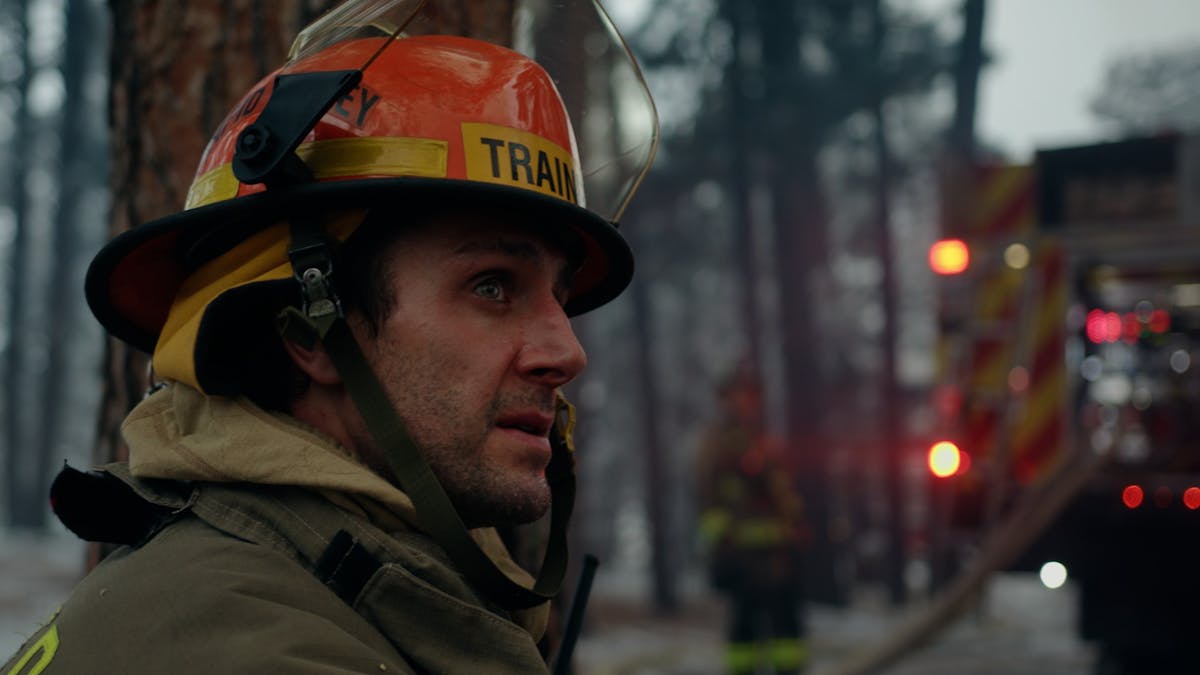Over the last 17 years, Garrett Klotz has forged a reputation centered around protection. A bodyguard of sorts, Klotz is the first to answer the bell and step up for any one of his teammates—or for the red ‘R’ on his chest, when his team needs a boost.
Even at 36, Klotz continues to rack up the highlights. Who could forget his viral fight against Daniel ‘Diamond Hands’ Amesbury back in November, a throwdown that reminded hockey fans of the olden days when enforcers like them were commonplace?
On Monday, he answered a bell he had never answered before.
A quick peek at the calendar shows that January 6th, 2025 was not a game day. In fact, not a single Rush player even touched the ice that morning. A few miles from the rink, Klotz was milling around inside the Rapid Valley Fire Department’s headquarters off Highway 44 when an urgent call came in. Within minutes, the volunteer firefighters were off to the Rockerville area to battle a two-alarm structure fire.
Having traded in his black Rush helmet—with the unmistakable number 88 on the back—for an orange helmet sporting a ‘TRAINEE’ decal in that same spot, Garrett Klotz registered his first fight as a member of RVFD.
“Firefighting has kind of always been a childhood dream,” said Klotz. “Just like playing hockey. When I was younger and the teacher asked me what I wanted to be when I get older, it was a professional hockey player or a firefighter. I am just fortunate enough that it is working out that way.”
Throughout this season, his seventh with the Rush and 17th in professional hockey, Klotz has been enrolled at RVFD. Currently, he is a trainee—a rookie at the bottom of the totem pole. Much like the routine in hockey he knows so well, there are copious amounts of preparation required. The Rush’s morning practices go hand-in-hand with the training Klotz undergoes at the fire station at night. Just as his coaches show video from the previous night’s game, there are meetings with his superiors. Every bit helps when a ‘game situation’ comes up—on or off the ice.
“The thing that I think draws athletes like Garrett is the team atmosphere that the fire service provides,” explained Jim Bussell, Captain and Paramedic at Rapid Valley. “You are doing everything together. If you are working at a career department, you are sleeping in the same building, you are eating together, you are working out together. In a volunteer department like this, we are training together and we do family activities together. So there is that camaraderie and that is something you can not replicate in any other career in America.”
Klotz, whose presence as a leader and mentor in the Rush locker room cannot be overstated, embraces the ‘band of brothers’ mentality and attributes part of his smooth transition to that similarity.
“Either way you look at it, it is one team and then another team,” said Klotz. “We all have each other’s backs. In hockey, you have 20 guys that you need to protect. Just like firefighting, you have 20 guys that you need to protect. So everyone has each other’s backs, and that is how we roll.
“I just want to be a part of something that gets the adrenaline going,” Klotz continued. “Once I step away from hockey, I am going to need to find something to fill that void. I think firefighting will do that. I get a rush from it, the team atmosphere and just hanging out at the hall with the boys.”
You won’t find a hockey player with such a high level of experience who isn’t motivated by the love of the game. A game they have, in most cases, known since age three or four. Long since all motivation for monetary reasons has passed, everything circles back to one’s childhood dreams of lacing up the skates.
Even at this stage in his career—Klotz openly admits he is ‘the old guy by far’—the Saskatchewan native has stayed in incredible shape, which has already served him well as he takes on another physically demanding career.
“We have seen that he is a competitor,” said Bussell. “We had some pretty intense training that we refer to as ‘rapid intervention.’ It deals with rescuing a downed firefighter and it can be kind of a butt kicker. He finished that drill basically carrying the dummy one-handed. His physical nature and competitive spirit have served him well so far, and as he continues to navigate this process, learning how to become a firefighter and balance everything, that is going to serve him well.”
According to FEMA, 96.6 percent of the 294 registered fire departments in South Dakota are categorized as ‘Volunteer’ or ‘Mostly volunteer’ fire stations. Nationally, 52 percent of active firefighting personnel are volunteers. That is over a half million folks who donate their time to stay on guard and keep their communities safe.
Klotz’s community involvement has long preceded this new chapter of his life. Never one to shy away from an autograph or selfie request from Rush fans, Klotz has helped grow the game through his annual ‘Kamp Klotz’ program, developing youth players in the area during the offseason. His efforts off the ice earned him the Blaine Jarvis Heart and Soul Award in 2024, the highest honor the organization can bestow on a player.
“(The community) comes first. The community is why we do what we do,” said Klotz. “We do it to protect others, take care of others, and make sure everyone is safe and sound.
“Just knowing I am able to help and provide and be there when someone needs me,” he reflected. “Whether that be my family, my teammates, the guys at the fire hall and the community. Just being someone they can rely on to take care of business and be there when they need me. I want to do what I can to help everyone.”
Bussell brought up another key word: balance. Klotz is a family man, having made a full-time home out of Rapid City with his wife Shalyn, and two daughters, Lola and Violet. Family is number-one for Klotz, and back home, he is a devoted father who never lets a busy schedule get in the way.
“(Balancing everything) can be challenging at times, not only mentally but physically, because it is just such a long schedule,” explained Klotz. “I am up early in the mornings getting my daughters ready at 7:30, then I have to take them to school, and I have to make sure everyone is fed. Then go to the rink, skate, work out, come home, take care of the wife, pick up the kids, then come to fire training after all of that.
“It is just a lot on my plate, but I am finding a way to do it,” Klotz continued. “It is tough, but I am getting used to it. It helps having my wife there to support me.”
Just like a rookie in the ECHL, Klotz is continuing to put in the man-hours with the goal of graduating out of trainee status later this year. Even if his time on the ice is nearing a close, at just 36 years young, the gentle giant’s story of resilience, grit, teamwork, and the drive to make a lasting impact is only getting started.
“I think success (in life) means I am making my wife and family proud and happy,” said Klotz. “Success could mean a multitude of things. It could be money for some people. It could be material things for others. For me, it is just having a happy wife and happy life. With that comes a happy family. So I think if they are taken care of and I am taken care of, I think that is all you really need in life. Everything kind of trickles down from there.”





















 Adirondack Thunder
Adirondack Thunder
 Allen Americans
Allen Americans
 Atlanta Gladiators
Atlanta Gladiators
 Bloomington Bison
Bloomington Bison
 Cincinnati Cyclones
Cincinnati Cyclones
 Florida Everblades
Florida Everblades
 Fort Wayne Komets
Fort Wayne Komets
 Greensboro Gargoyles
Greensboro Gargoyles
 Greenville Swamp Rabbits
Greenville Swamp Rabbits
 Idaho Steelheads
Idaho Steelheads
 Indy Fuel
Indy Fuel
 Iowa Heartlanders
Iowa Heartlanders
 Jacksonville Icemen
Jacksonville Icemen
 Kalamazoo Wings
Kalamazoo Wings
 Kansas City Mavericks
Kansas City Mavericks
 Maine Mariners
Maine Mariners
 Norfolk Admirals
Norfolk Admirals
 Orlando Solar Bears
Orlando Solar Bears
 Rapid City Rush
Rapid City Rush
 Reading Royals
Reading Royals
 Savannah Ghost Pirates
Savannah Ghost Pirates
 South Carolina Stingrays
South Carolina Stingrays
 Tahoe Knight Monsters
Tahoe Knight Monsters
 Toledo Walleye
Toledo Walleye
 Trois-Rivières Lions
Trois-Rivières Lions
 Tulsa Oilers
Tulsa Oilers
 Utah Grizzlies
Utah Grizzlies
 Wheeling Nailers
Wheeling Nailers
 Wichita Thunder
Wichita Thunder
 Worcester Railers
Worcester Railers